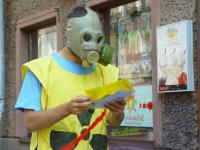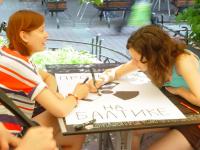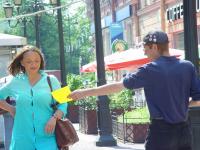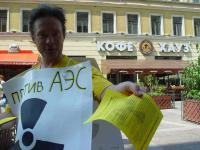The anti-nuclear Baltic Sea Info Tour stopped in St. Petersburg from July 6-8. We provided a public information event, a public street action and a regional network gathering here. After that we had one day for an interim evaluation of the first part of our tour. Anyway, participiants are still more than welcome to join the next parts of the tour.
St. Petersburg is with some 4.6 million inhabitants the second largest city in Russia and the fourth largest one in Europe. It is a major European cultural centre, and an important Russian port on the Baltic Sea. By the decision of Russian government, two new reactors are currently being built near the existing Leningrad NPP, which operates four Chernobyl-type RBMK-1000 reactors - some 80 kilometers west of St. Petersburg. There are many nuclear transports using it's harbour to ship uranium or nuclear waste to other countries - crossing big parts of the Baltic Sea.
Baltic Sea Info Tour Travel Schedule in Russia
- Monday (Jul 5): travelling from the previous stop in Helsinki to St. Petersburg
- Tuesday - Thursday (Jul 6-8): STOP in St. Petersburg
- Friday (Jul 9): INTERIM EVALUATION
- Saturday (Jul 10): travelling to the next stop in Riga
Report from St. Petersburg
On July 5 the „Stop Nuclear Power! Baltic Sea Info Tour 2010“ left Helsinki and headed to Russia. In St. Petersburg the anti-nuclear group „ECOperestroika“ had organized the programme for the infotour days in Russia. We started on July 6 with an introductional meeting to discuss the schedule of the next days and to start the preparation of a public street action.
Russian activists had stressed beforehand very much that it is difficult to do direct action in Russia and that permission of police is needed if you don't want to get arrested. Anyway, it seemed that foreign activists wouldn't be confronted by the same harsh repression as Russian activists would. However, the Russian group had applied for a police permission for a banner action in the center of St. Petersburg. But they didn't get an approval and so we had to discuss how to deal with the situation.
In Russia you need a police permission for demonstrations – which are, by definition gatherings of more than one person. The idea came up to have several „1-person-rallies“ - there would always be just one person with a banner distributing flyers in one place at the same time. People would shift after a while and there would have been people doing this action at the same time in several places. Anyway, local activists expected the police to intervene, as they wouldn't like anti-nuclear actions in the tourist season on the most famous places of St. Petersburg.
Eventually when we did the street action on Wednesday July 7 the police didn't intervene at all. They were even served with flyers, and obviously they didn't want to hassle with us. With the support of many local activists we spread hundreds of flyers informing about the radioactive threats to the Baltic Sea to passers-by of popular places in the second biggest city of Russia. We even needed to produce new copies in the meantime as the number of interested people was higher than expected (and because the police didn't stop the action). We had printed them in both Russian and English to reach as well Russians as international tourists.
In the evening a public information event about nuclear issues in the countries around the Baltic Sea took place in a popular bar. Speakers from Belarus, Germany and Russia informed about nuclear waste problems, the proposed new nuclear reactors in St. Petersburg and the nuclear developments in Belarus. Afterwards a discussion about possibilities to push authorities and companies to stop nuclear power came up. Some local people felt suspicious about direct action and the impact they could have to the decision makers at first; but the international activists also told many examples of actions against nuclear power in several countries as well as in Russia. As a result of the discussion, a political acitvist from St. Petersburg announced to ask the human rights council and the group Solidarnost to inculde our demands on their agenda. Another part of the evening was an introduction of the planned blockade of the Olkiluoto NPP in Finland on August 28 and the possibilty of participation of Russian activists there.
On the next day a press conference in the „Regional Press Institute“ had been organized together with the NGO „Green World“ (Zelenyi Mir) and ECOperestroika. We launched the Baltic Sea Info Tour to the Russian media in this independent press organization. One of the main focuses was the anti-nuclear resistance in other countries and to explain the wide range of possible actions that has been experienced around the world. The infotour is going to promote some bigger international actions taking place during the next months, such as the resistance against a high level radioactive waste transport to Greifswald (D), the Olkiluoto Blockade (FIN) and the CASTOR transport to Gorleben (D) in November.
The Russian NGO emphasized the impacts of nuclear facilities on the Baltic Sea and the effects of the radioactivity to people living around the sea and to sealife. The Baltic Sea is already the most radioactive sea in the world, and any additional pollution is increasing the risks of health effect and damages of the environment. Radioactivity would be ingested when eating fish or other sealife, because the radioactive nuclides are concentrated there. In the body especially alpha and beta emitters would damage easily the cells and can cause diseases as well as mutations of the genes.
An activist from Moscow explained the threats connected to the Leningrad NPP extension. It is a technology without any experiences in practice they want to install. A number of technical problems has already been figured out. Anyway, the Russian authorities want to push the project to produce electricity not for the region but just for export. Four new reactors are already under construction and two additional ones have been proposed. At the same time the Russian authorities approved also the lifetime extension of three old reactors of the Leningrad NPP.
Belarus has already been affected by nuclear power very much as the most of the radioactive Chernobyl accident fall-out reached this country. A huge number of residents are suffering from the catastrophe and the proposed new reactors in Kalingrad, St. Petersburg and Lithuania would increase the risk of more reactor hazards. However, even the Belarussian government is striving for nuclear power and wants to implement the same reactor type as it is planned for St. Petersburg as a Belarussian activist explained during the press conference.
The last day of the infotour stop in Russia was used for an intermediate evaluation of the first part of the tour. St. Petersburg was the fourth stop of the anti-nuclear project, and we would now figure out the outcome of our activities. While in Finland most people are experienced in speaking English and communication with foreigners was no big deal, our Russian experience is that the language barrier still exists and caused some difficulties from time to time. For us, these language problems resulted into a separation of smaller groups of activists with different language skills in St. Petersburg – thus it is challenging to the idea of acting as one movement.
After St. Petersburg the Baltic Sea Info Tour traveled to Riga (Latvia) and started the second part of the project there from July 11-13. During July 15-17 activities took place as well in Belarus as in Vilnius (Lithuania). Then we continued traveling around the Baltic Sea until the middle of August, where the infotour will end on August 21.
http://baltic-tour.nuclear-heritage.net
tour [at] nuclear-heritage.net





Introduction to the Infotour
German:
http://linksunten.indymedia.org/de/node/21640
English:
http://linksunten.indymedia.org/en/node/21841
Anti-Nuclear Bike Tour from Turku to Mariehamn
http://linksunten.indymedia.org/en/node/21878
Nuclear Shadow on Aland
http://linksunten.indymedia.org/de/node/22018
Atomic Death in Riga
http://linksunten.indymedia.org/de/node/23051#comment-8162
Anti-nuclear Stop in Lithuania
http://linksunten.indymedia.org/en/node/23669#comment-8172